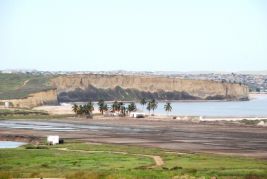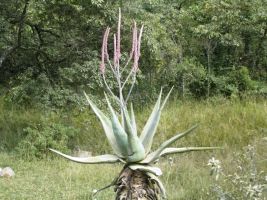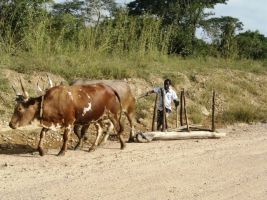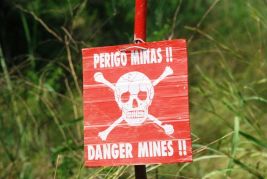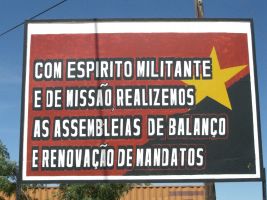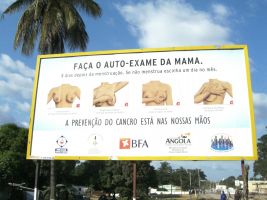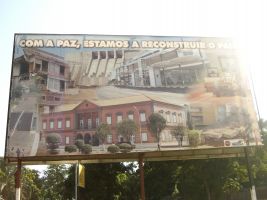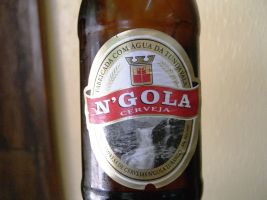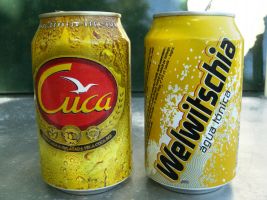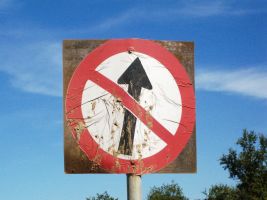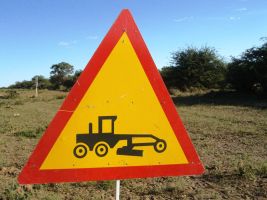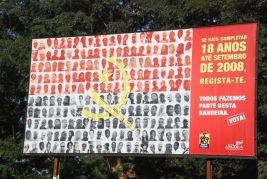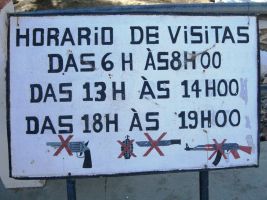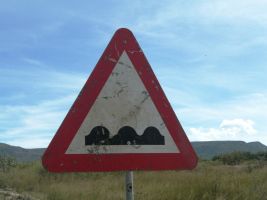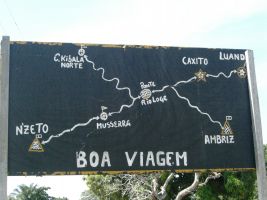
 Italia
Italia France
France Spain
Spain Morocco
Morocco Mauritania
Mauritania Senegal
Senegal Mali
Mali Burkina
Burkina Ghana
Ghana Togo
Togo Benin
Benin Nigeria
Nigeria Cameroon
Cameroon Gabon
Gabon Sao Tomè
Sao Tomè Gabon 2
Gabon 2 Congo
Congo Congo DCR
Congo DCR Angola
Angola Namibia
Namibia Sud Africa
Sud Africa Namibia 2
Namibia 2 Botswana
Botswana Zimbabwe
Zimbabwe Botswana 2
Botswana 2 Sud africa 2
Sud africa 2 Swaziland
Swaziland Mozambico
Mozambico Malawi
Malawi Tanzania
Tanzania Rwanda
Rwanda Uganda
Uganda Kenya
Kenya Etiopia
Etiopia Sudan
Sudan Egitto
Egitto Libia
Libia Tunisia
Tunisia Malta
Malta
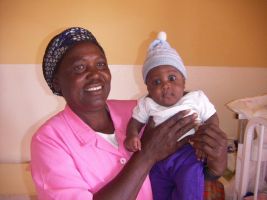
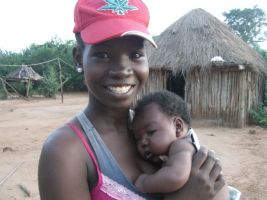
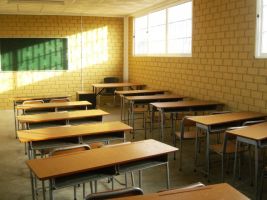
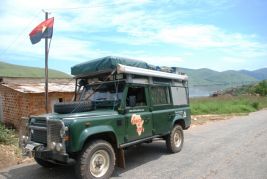
Noqui frontier – 29th April 2008
Following the very slow and umpteenth procedure of taking our personal details and writing them out in the usual book, we fill in two identical forms. After 45 minutes of painstaking control procedures, the customs official finally decides to stamp our passports. A few more minutes for the stamps on the Carnet and eventually, come 11:30 we are ready to cross Angola; now in four and a half days, as half a day has already been spent dealing with the inadequate and incompetent local bureaucracy.
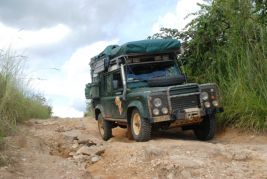
First day
The track is in terrible condition; muddy with knee-deep potholes. There are some hollows where the water has even reached the bonnet.
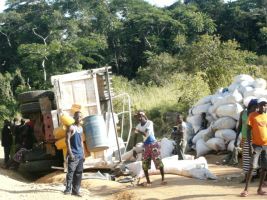
Suddenly, we are faced with an unexpected event; a lorry carrying peanuts has overturned. We cannot leave the track as we are surrounded by minefields, a reminder of the recent war. We manage a skilled manoeuvre sideways and make a lucky escape. Amongst the many people who witnessed our manoeuvre, were some kids covered in oil and grease who ask us to take some engine parts to the next village.
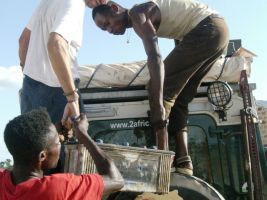
We load the pieces on the roof rack and give one of the guys a lift - even a police officer thanks us. When we get to the nearest village, we unload the “cargo” and begin to ask ourselves the reason we became embroiled in this; we satisfy ourselves that it was probably a security measure to avoid a possible theft. Later on, after talking with locals, we discover that we were in fact the thieves!
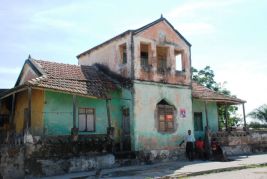
Tomboco
After a seven-hour drive and 220km of track, we get to Tomboco. The Catholic mission is the only shelter here. GPS S06°48.370’ E013°19.720’
A new school has just been opened here.
Four orphan girls live here in the mission. We leave a $50 contribution towards their education costs (all details in the solidarity section)
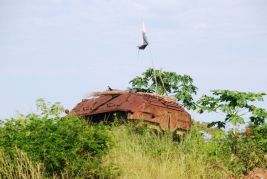
Second day – towards Luanda
The track gets better and we manage to reach speeds up to 30km/h. At the entrance of the city, MPLA flags - the current political party – are waving.
The local elections will be held in September, and since this is an area of the party in opposition, the current Government has chosen this style of propaganda. T-shirts and caps are also given away – amongst other things, it would be better if the money were spent towards the maintenance of roads! Perhaps they want to keep the opposing party areas difficult to reach… you never know…
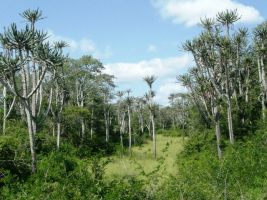
The forest starts to thin-out and the landscape changes. We now see succulent plants with thick fleshy leaves; some are as high as trees. Slowly all this will disappear and the scenery will become like a desert.
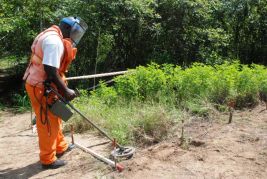
Mines
Delicate and dangerous work - they search the mines that have been signalled by farmers.
Accidents - an explosion, someone mutilated or killed are all part of this new kind of work.
Italy has recently undersigned an agreement to help the Government's mine-clearing program in the Angolan territory.
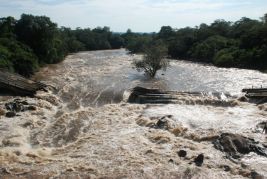
So much water!
Rivers are still swollen with water. The seasonal storms, furious and violent are abating during this period. The recent floods in Namibia have left many dead and destroyed property and agricultural land.
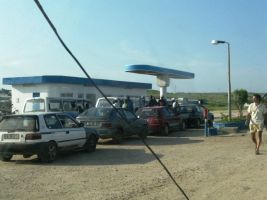
It is impossible to find Diesel. All the petrol stations are closed. You can fill up by turning to the black market and paying three times as much - 100Kwanza as apposed to 29! Luckily, we still have 600km supply in our tanks, so we will fill up next on the outskirts of Luanda.
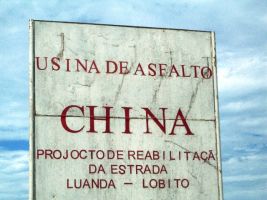
Luanda!
This is truly a traffic jam! Approaching the city there are road works everywhere. Hundreds of Lorries and workers - many labourers are from China. Often workers are prisoners without passports who make for cheap labour. It takes us almost three hours to travel 6km to the centre. We don’t have enough time for the night stop, but we still want to look for a centre for charity (refer to the solidarity section for all details).
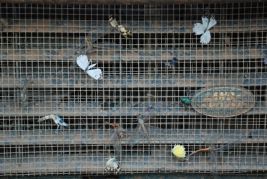
Third day – towards Benguela
The road is good, good enough for 100km/h at the expense of some insects and dragonflies.
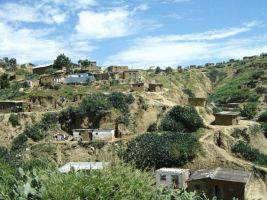
Benguela
Banguela looks like a Tunisian city. The landscape has completely transformed; we have gone from the forest to desert.
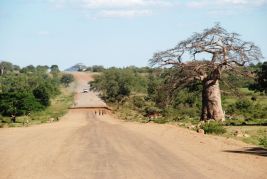
We are ahead of our scheduled time, but we decide to carry on going, as we know that the road ahead gets worse and we will have to slow down later.
Wonderful baobabs start to appear.
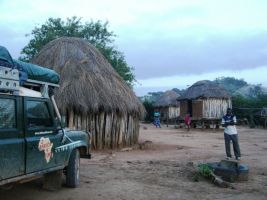
At sunset, we are on the track and we ask a village chief the possibility of spending the night among the village huts. The whole community are members of his family. GPS S13°27.162’ E 013°53.148’
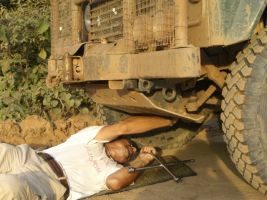
Alba
We leave at dawn. Apart from the usual checks to the engine oil and to the radiator water level, I check the oil of the front differential and add 200ml. I find that the oil reducer is completely empty, and I add 600 ml. There aren’t any external drops and I wonder where it has all gone. We had filled it up in Cameroon, 5,000km ago. Maybe the washers between the gearbox and the reducer have deteriorated.
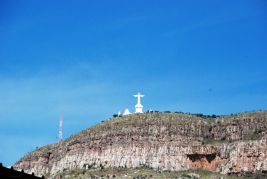
Lubango -2nd April 2008
On a hill, a statue of Christ faces Lubango; it is just the same as the one in Rio De Janeiro. The two statues look alike and in some ways, they draw the two populations closer: Angola on one side and the Brazilian slaves who, for many centuries, were deported from Angola to the other side of the ocean. Still today, Angolan people speak Portuguese.
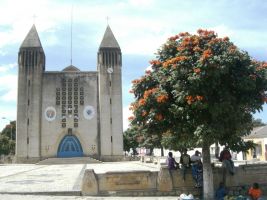
Lubango is a nice city and we wish we could stop longer to visit it properly. However, we just haven’t the time... damned transit Visas! We check our e-mail in an internet cafe while eating a doughnut and sipping an N’Gola beer.
We buy a special spanner for K7 and then …we skedaddle!
On the road again...
We see a strange sleigh and even stranger flowers…
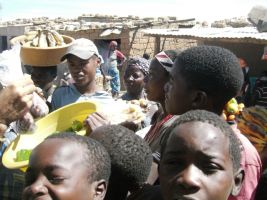
When you stop in the villages, street vendors crowd around the car trying to sell you anything …they are pressed-up so close they would be inside if they could.
We buy fresh peppers, grilled chicken, chips and hazelnuts.
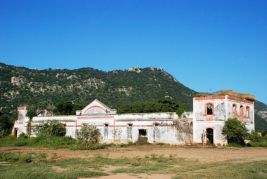
Cahama
There are the ruins of Old Portuguese houses, even now; they instil a sense of their passed affluence.
As sunset approaches, we ask police officers where we could spend the night. They tell us that there is a mission run by Mexican Fathers. We are invited to stay in their internal courtyard. GPS S16°16.769’ E014°18.407’. They haven’t been here long and there is a plan to open a school and an orphanage.
The Fathers are very polite and, as they are well looked after and financially supported by the Mexican church, we decide not to leave an Elfo token.
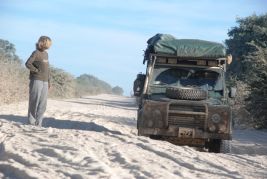
Powdery road
On this last day, the roads once again deteriorate; their surface is covered by 20cm of thin powder. Potholes are so big that a car fits inside and many form steps over half a meter high.
There is an alternative track, but it is muddy and also full of holes, some of which prove to be very difficult to get out.
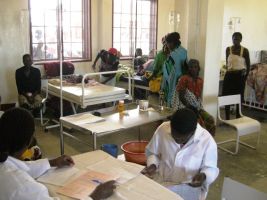
Chullo Hospital
We take a diversion from our route, as we learn that there is a hospital run by Italian volunteers. We meet Alessandro -from Val D’Aosta- who has lived here for 4 years and Marina - from Tuscany - who has started to organize the building 6 years ago as the Angolan management was going to rack and ruin. Six other Italians who are all part of ONG CUAMM help them.
The staff tells us that they have just got over a cholera emergency and that now they are dealing with cerebral malaria, which is at its worst during this season. We decide to help Angelo, a newborn baby (details in the Solidarity section)
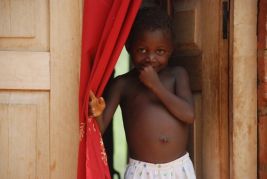
Frontier! End of the road.
It is 15:20 and we reach the border: we have managed it!
Police control (with a computer!), the first we have seen since entering Morocco. The stamp is issued fairly quick and easy. In 40 minutes, we are in no-man’s-land.
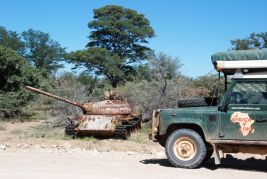
Points on Visas
We knew before embarking upon this journey, that this would turn out to be the most difficult Visa to obtain. Here is a summary of our attempts in the various Angolan embassies.
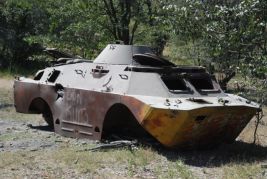
Embassy in GHANA
With a presentation letter kindly given to us by the Italian Ambassador De Agostini, we are told to wait in the lobby; after an hour, they tell us that the ambassador has in fact just left the building and that, anyway, they could not issue Visas to non-residents. We could, by all means, try again tomorrow (the next day the embassy is closed).
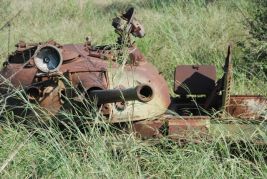
Embassy in NIGERIA
We call to find out the opening times. We are told that Visas are only issued to residents. We do know that last year, an English couple was able to obtain a tourist Visa. In addition to a phone call kindly made by the Italian ambassador Baistrocchi to an embassy official and a presentation note about our mission to the Angolan embassy in Rome and in Luanda (the capital) we have high hopes. We also have a letter from the Namibian consul in Italy who request that the Visas be issued.
After an hour’s wait outside the embassy and a further 50-minute wait in the waiting room, two solemn looking officials receive us. They inform us that they cannot issue the Visas but that they have sent the documents to the capitals and are now awaiting an answer. They do not know when they will receive a reply, if at all. We tell them that we cannot remain in Abuja indefinitely, but they say we should be calm. When they receive an answer, they will fax it to the embassy offices covered by our journey.
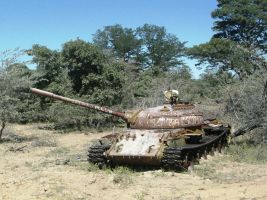
Embassy in GABON
We write to the Italian embassy asking for advice.
They don't reply
At the Angolan embassy there is no trace of the fax; furthermore, they say that there should not be any problems but they have unfortunately finished all the labels, which they issue on the visas, and they do not know when more labels will be arriving.
This excuse was used two months ago with other English over Landers. A few months just to get some sticky labels!
Communication between Gabon and Angola must be bad!
It is a wonder how they manage to issue daily visas to residents …
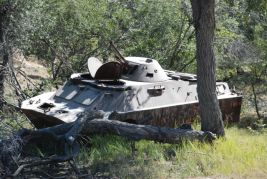
Embassy in SAO TOME
We are received by a welcoming first counsellor that speaks good Italian.
We explain the situation and he is very sorry that the law is so restrictive but if we are not residents on the island then he cannot help us.
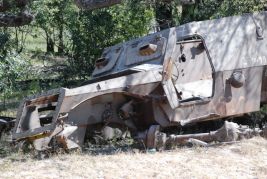
Embassy in CONGO.
We have heard the story of the two American over-landers who a few months ago had their visas refused here in Brazzaville.
We are also aware that this embassy is notorious for wasting time costing many applicants days.
Day one.
We go to the embassy only to be told by the porter that there is no one in; all the bosses are out, and so are their secretaries.
A new ambassador is arriving and so they are all at the airport; furthermore, there appears to be no trace of a fax from Nigeria.
Day two.
The porter tells us the person responsible for visas, together with his secretary is out. During the morning, a police marshal from the Italian embassy had tried in vain to contact them to arrange a meeting with us. We learn that the phone number is an old one and so we are given their current one.
Using this current phone number, the marshal makes many attempts, in the end we manage to get the visas office secretary’s phone number; however, we think that we will just lose more time, and so, we don’t try the number, instead we ferry across to Kinshasa were we are rejected.
Third attempt.
We show up an hour before the time of opening at the embassy determined to get something done. With the help of the porter and the gardener we are able to get in. we are told that they were waiting for us yesterday (!). A person responsible for the office is very kind and polite, he doesn’t issue the visa, but he writes out and hands us a letter of introduction for the Matadi consulate (Congo DCR) so that they can at least issue a transit visa. (This letter is essential to retry for entrance in to Congo DCR)
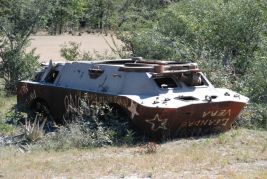
Embassy in CONGO DCR(ex Zaire)
We write to the Italian embassy for some advice.
In a one-line response, they tell us that they only issue visas to residents here. We knew this; furthermore, they give us no indication whatsoever of how to tackle or resolve this problem.
We ask again… no response.
We do not even attempt Kinshasa.
We go to the border of Matadi. We still have some hope of obtaining a few more days. We take all the possible documents that may help us…
The letter from the Italian ambassador in Nigeria
The invitation letter from the Namibian consul in Italy
The letter of introduction from the Angolan first counsellor in Congo
The letter signed in Portuguese (written by a friend in Sao Tomè) that explains and talks about our travels, past, present and future.
Not a single document is considered.
Then, a seven hour wait in the waiting room without food or water.
After this, officials interview us, during which, they ask us about absolutely everything (names and addresses of uncles and aunties and if they are alive, our political and religious beliefs….)
We leave with a transit visa that is valid for 5 days from tomorrow.
End of ordeal
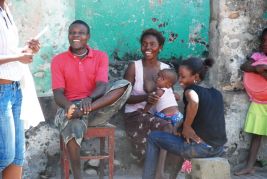
Our Impressions
It is difficult not to feel a little resentful towards these short-sighted, obtuse and uptight Angolan bureaucrats.
Their myopic intellect coupled with unbelievable stiffness has forced us down a dangerous and exhausting route.
Everyday, we came across small towns that we would have loved to visit.
Friendly people that we could have visited and got to know better.
We were unable to pay a visit to the two social solidarity centres that we knew and that we had planned to help. We couldn’t even take the time to spend money in the markets, in the museums, in the shops or even restaurants; precious money, much needed by the local businesses and their country and so helping, all but it in a small way, to augment the well-being of their fellow citizens.
There were the wonderful beaches, tracks and off-roads that twist through the landscape that we were not able to experience.
To add to our anger, we found that the officials of the internal immigration were surprised and could not believe that we had been only given five days.
From the South it is relatively easy to get a touristic visa and Namibians do not even need it.
The joke is, the Angolan Ministry of Tourism produces publicity, inviting people to visit the country!!!
Between these ministries, they should try communicating and make some effort to sort-things-out!
